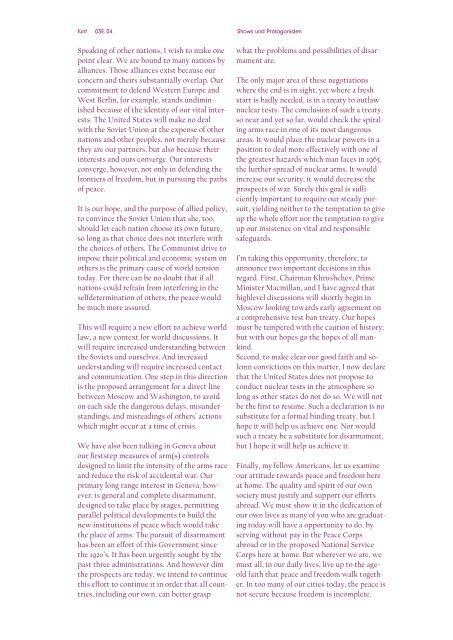KUNST DER DEMOKRATIE - Die Redner
KUNST DER DEMOKRATIE - Die Redner
KUNST DER DEMOKRATIE - Die Redner
Sie wollen auch ein ePaper? Erhöhen Sie die Reichweite Ihrer Titel.
YUMPU macht aus Druck-PDFs automatisch weboptimierte ePaper, die Google liebt.
fünf 03E. 04 Shows und Protagonisten<br />
Speaking of other nations, I wish to make one<br />
point clear. We are bound to many nations by<br />
alliances. Those alliances exist because our<br />
concern and theirs substantially overlap. Our<br />
commitment to defend Western Europe and<br />
West Berlin, for example, stands undiminished<br />
because of the identity of our vital interests.<br />
The United States will make no deal<br />
with the Soviet Union at the expense of other<br />
nations and other peoples, not merely because<br />
they are our partners, but also because their<br />
interests and ours converge. Our interests<br />
converge, however, not only in defending the<br />
frontiers of freedom, but in pursuing the paths<br />
of peace.<br />
It is our hope, and the purpose of allied policy,<br />
to convince the Soviet Union that she, too,<br />
should let each nation choose its own future,<br />
so long as that choice does not interfere with<br />
the choices of others. The Communist drive to<br />
impose their political and economic system on<br />
others is the primary cause of world tension<br />
today. For there can be no doubt that if all<br />
nations could refrain from interfering in the<br />
self determination of others, the peace would<br />
be much more assured.<br />
This will require a new effort to achieve world<br />
law, a new context for world discussions. It<br />
will require increased understanding between<br />
the Soviets and ourselves. And increased<br />
understanding will require increased contact<br />
and communication. One step in this direction<br />
is the proposed arrangement for a direct line<br />
between Moscow and Washington, to avoid<br />
on each side the dangerous delays, misunderstandings,<br />
and misreadings of others’ actions<br />
which might occur at a time of crisis.<br />
We have also been talking in Geneva about<br />
our first step measures of arm(s) controls<br />
designed to limit the intensity of the arms race<br />
and reduce the risk of accidental war. Our<br />
primary long range interest in Geneva, however,<br />
is general and complete disarmament,<br />
designed to take place by stages, permitting<br />
parallel political developments to build the<br />
new institutions of peace which would take<br />
the place of arms. The pursuit of disarmament<br />
has been an effort of this Government since<br />
the 1920’s. It has been urgently sought by the<br />
past three administrations. And however dim<br />
the prospects are today, we intend to continue<br />
this effort to continue it in order that all countries,<br />
including our own, can better grasp<br />
what the problems and possibilities of disarmament<br />
are.<br />
The only major area of these negotiations<br />
where the end is in sight, yet where a fresh<br />
start is badly needed, is in a treaty to outlaw<br />
nuclear tests. The conclusion of such a treaty,<br />
so near and yet so far, would check the spiraling<br />
arms race in one of its most dangerous<br />
areas. It would place the nuclear powers in a<br />
position to deal more effectively with one of<br />
the greatest hazards which man faces in 1963,<br />
the further spread of nuclear arms. It would<br />
increase our security; it would decrease the<br />
prospects of war. Surely this goal is sufficiently<br />
important to require our steady pursuit,<br />
yielding neither to the temptation to give<br />
up the whole effort nor the temptation to give<br />
up our insistence on vital and responsible<br />
safeguards.<br />
I’m taking this opportunity, therefore, to<br />
announce two important decisions in this<br />
regard. First, Chairman Khrushchev, Prime<br />
Minister Macmillan, and I have agreed that<br />
high level discussions will shortly begin in<br />
Moscow looking towards early agreement on<br />
a comprehensive test ban treaty. Our hopes<br />
must be tempered with the caution of history;<br />
but with our hopes go the hopes of all mankind.<br />
Second, to make clear our good faith and solemn<br />
convictions on this matter, I now declare<br />
that the United States does not propose to<br />
conduct nuclear tests in the atmosphere so<br />
long as other states do not do so. We will not<br />
be the first to resume. Such a declaration is no<br />
substitute for a formal binding treaty, but I<br />
hope it will help us achieve one. Nor would<br />
such a treaty be a substitute for disarmament,<br />
but I hope it will help us achieve it.<br />
Finally, my fellow Americans, let us examine<br />
our attitude towards peace and freedom here<br />
at home. The quality and spirit of our own<br />
society must justify and support our efforts<br />
abroad. We must show it in the dedication of<br />
our own lives as many of you who are graduating<br />
today will have a opportunity to do, by<br />
serving without pay in the Peace Corps<br />
abroad or in the proposed National Service<br />
Corps here at home. But wherever we are, we<br />
must all, in our daily lives, live up to the ageold<br />
faith that peace and freedom walk together.<br />
In too many of our cities today, the peace is<br />
not secure because freedom is incomplete.


